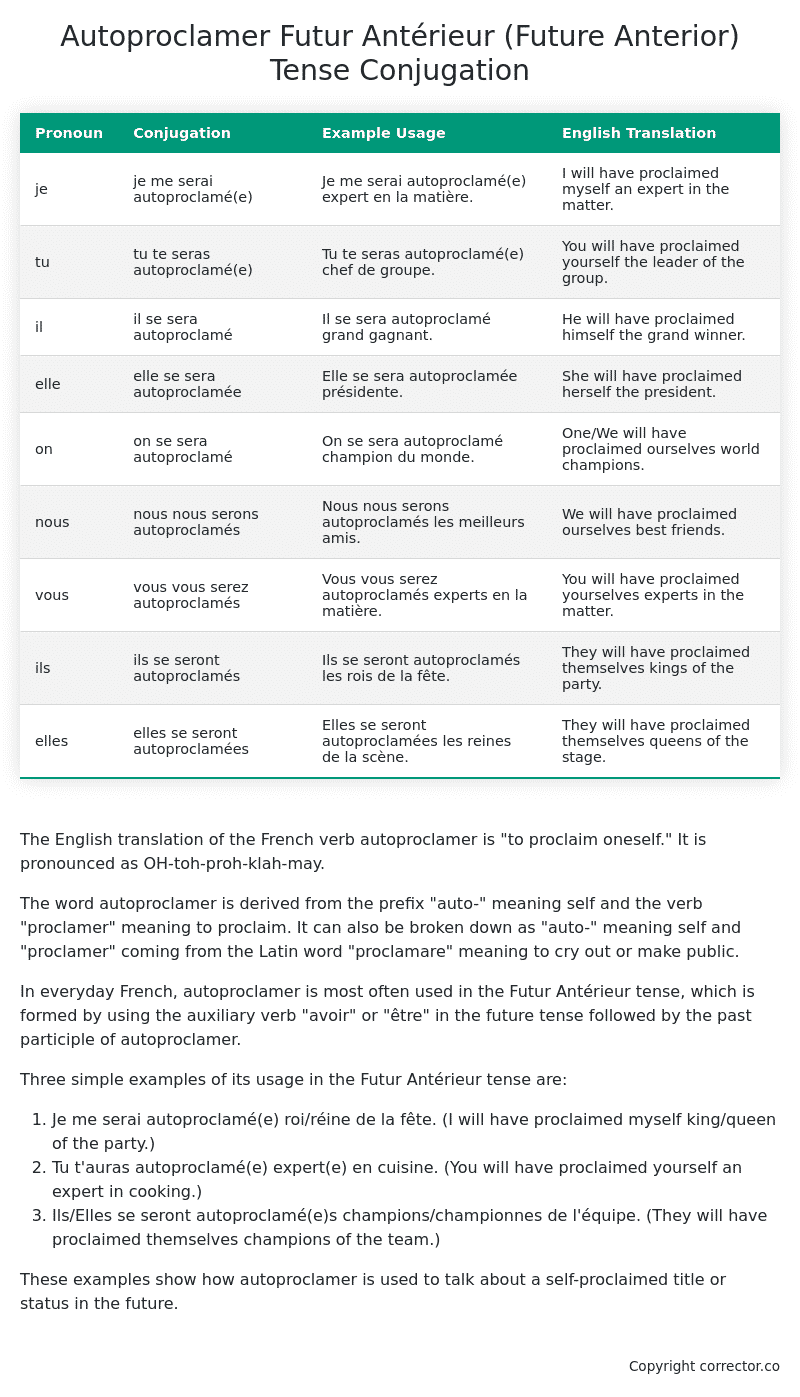Futur Antérieur (Future Anterior) Tense Conjugation of the French Verb autoproclamer
Introduction to the verb autoproclamer
The English translation of the French verb autoproclamer is “to proclaim oneself.” It is pronounced as OH-toh-proh-klah-may.
The word autoproclamer is derived from the prefix “auto-” meaning self and the verb “proclamer” meaning to proclaim. It can also be broken down as “auto-” meaning self and “proclamer” coming from the Latin word “proclamare” meaning to cry out or make public.
In everyday French, autoproclamer is most often used in the Futur Antérieur tense, which is formed by using the auxiliary verb “avoir” or “être” in the future tense followed by the past participle of autoproclamer.
Three simple examples of its usage in the Futur Antérieur tense are:
- Je me serai autoproclamé(e) roi/réine de la fête. (I will have proclaimed myself king/queen of the party.)
- Tu t’auras autoproclamé(e) expert(e) en cuisine. (You will have proclaimed yourself an expert in cooking.)
- Ils/Elles se seront autoproclamé(e)s champions/championnes de l’équipe. (They will have proclaimed themselves champions of the team.)
These examples show how autoproclamer is used to talk about a self-proclaimed title or status in the future.
Table of the Futur Antérieur (Future Anterior) Tense Conjugation of autoproclamer
| Pronoun | Conjugation | Example Usage | English Translation |
|---|---|---|---|
| je | je me serai autoproclamé(e) | Je me serai autoproclamé(e) expert en la matière. | I will have proclaimed myself an expert in the matter. |
| tu | tu te seras autoproclamé(e) | Tu te seras autoproclamé(e) chef de groupe. | You will have proclaimed yourself the leader of the group. |
| il | il se sera autoproclamé | Il se sera autoproclamé grand gagnant. | He will have proclaimed himself the grand winner. |
| elle | elle se sera autoproclamée | Elle se sera autoproclamée présidente. | She will have proclaimed herself the president. |
| on | on se sera autoproclamé | On se sera autoproclamé champion du monde. | One/We will have proclaimed ourselves world champions. |
| nous | nous nous serons autoproclamés | Nous nous serons autoproclamés les meilleurs amis. | We will have proclaimed ourselves best friends. |
| vous | vous vous serez autoproclamés | Vous vous serez autoproclamés experts en la matière. | You will have proclaimed yourselves experts in the matter. |
| ils | ils se seront autoproclamés | Ils se seront autoproclamés les rois de la fête. | They will have proclaimed themselves kings of the party. |
| elles | elles se seront autoproclamées | Elles se seront autoproclamées les reines de la scène. | They will have proclaimed themselves queens of the stage. |
Other Conjugations for Autoproclamer.
Le Present (Present Tense) Conjugation of the French Verb autoproclamer
Imparfait (Imperfect) Tense Conjugation of the French Verb autoproclamer
Passé Simple (Simple Past) Tense Conjugation of the French Verb autoproclamer
Passé Composé (Present Perfect) Tense Conjugation of the French Verb autoproclamer
Futur Simple (Simple Future) Tense Conjugation of the French Verb autoproclamer
Futur Proche (Near Future) Tense Conjugation of the French Verb autoproclamer
Plus-que-parfait (Pluperfect) Tense Conjugation of the French Verb autoproclamer
Passé Antérieur (Past Anterior) Tense Conjugation of the French Verb autoproclamer
Futur Antérieur (Future Anterior) Tense Conjugation of the French Verb autoproclamer (this article)
Subjonctif Présent (Subjunctive Present) Tense Conjugation of the French Verb autoproclamer
Subjonctif Passé (Subjunctive Past) Tense Conjugation of the French Verb autoproclamer
Subjonctif Imparfait (Subjunctive Imperfect) Tense Conjugation of the French Verb autoproclamer
Conditionnel Présent (Conditional Present) Tense Conjugation of the French Verb autoproclamer
Conditionnel Passé (Conditional Past) Tense Conjugation of the French Verb autoproclamer
L’impératif Présent (Imperative Present) Tense Conjugation of the French Verb autoproclamer
L’infinitif Présent (Infinitive Present) Tense Conjugation of the French Verb autoproclamer
Struggling with French verbs or the language in general? Why not use our free French Grammar Checker – no registration required!
Get a FREE Download Study Sheet of this Conjugation 🔥
Simply right click the image below, click “save image” and get your free reference for the autoproclamer Futur Antérieur tense conjugation!

Autoproclamer – About the French Futur Antérieur (Future Anterior) Tense
Construction
Common Everyday Usage Patterns
Interactions with Other Tenses
For example
Summary
I hope you enjoyed this article on the verb autoproclamer. Still in a learning mood? Check out another TOTALLY random French verb conjugation!


